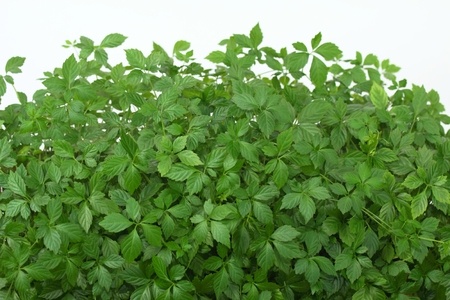Jiaogulan - Five-leaf Ginseng

Common Names: Jiaogulan, Five-leaf Ginseng, Southern Ginseng, Herb of Immortality, Gynostemma pentaphyllum, Amachazuru (Japanese), Xianxao (Chinese), Miracle Grass, Immortality Herb, Global, English, Latin, Origin
Latin Name: Gynostemma pentaphyllum
Origin: Asia
Short Introduction
Jiaogulan is a vining plant that can be easily grown in a pot with a sturdy support for it to climb. It's best cultivated in a mobile planter so it can be taken indoors during harsh winter frosts, as these can harm the plant. Typically, it survives winter through its roots, so watering should be limited during the cold months. In spring, Jiaogulan sprout anew. The plant prefers partial shade and moist, humus-rich soil.
Detailed Description
A revitalizing herb known as the 'herb of immortality,' reputed for its abilities to delay heart attacks and help counter cancer-related complications.
Botanical Information
Jiaogulan is a dioecious (having separate male and female plants) climbing vine whose divided leaves are most commonly found in groups of five, though clusters of 4 to 7 leaves can also occur. It belongs to the gourd family (Cucurbitaceae), which also includes watermelon and squash.
Origin and Distribution
The native region of Jiaogulan is believed to be Southwest China, but it has spread extensively throughout the country and to nearby regions, including Vietnam, Korea, Japan, and even India.
Usage / Dosage
In regions where Jiaogulan is traditionally consumed as a tea, there is a notable presence of aging yet vigorous populations, with some of the world's lowest rates of cancer.
Antioxidant effects of Jiaogulan come mainly from its influence on superoxide dismutase, a key internal (endogenous) antioxidant in the human body. Research also confirms its role in mobilizing T lymphocytes (a type of white blood cell), NK cells (natural killer cells), and macrophages, all components of the innate immune system that together support the body's vitality and resilience.
Adaptogenic effects are attributed to the above properties, along with the positive actions of gypenosides on blood pressure, contributing to increased resistance to stress, greater endurance, and stable overall balance (homeostasis).
Antihypertensive activity is also linked to gypenosides, which directly stimulate nitric oxide production in heart cells, thereby effectively supporting cardiovascular health and helping to regulate blood pressure.
Cardiovascular benefits have been observed in studies where Jiaogulan, especially when combined with other medicinal herbs, reduced heart rate, improved blood vessel capacity, and enhanced circulation—lowering the risk of heart attack and stroke without negatively impacting arterial pressure.
Antidiabetic effects arise from the plant's saponins, which can favorably impact blood glucose levels in people with type 2 diabetes. Jiaogulan is recommended for diabetes prevention, especially for those with a family history or predisposing conditions (such as metabolic syndrome).
Anti-atherogenic influence results from its positive effects not only on blood pressure and blood sugar but also on lowering 'bad' LDL cholesterol and raising 'good' HDL cholesterol.
Active Compounds
The most potent constituents of Jiaogulan are triterpenoid saponins—specifically, gypenosides—that are chemically and pharmacologically similar to the ginsenosides found in Panax ginseng. Jiaogulan contains about 82 distinct saponins, each with unique health benefits, and these compounds are only found in plants.
Traditional Dosage
Traditionally, Jiaogulan is consumed as a tea, but it is also available as a tincture (alcohol extract) or in compressed tablet form.
Fresh leaves can be used for tea or added to salads. Dried leaves are typically steeped at a dose of about 1 gram per teapot with water heated below 100°C. The infusion is mild after 1–2 minutes but becomes stronger, more aromatic, and robust in flavor the longer it steeps. Everyone is encouraged to experiment and find their preferred steeping time and strength. The tea is clear, with a refreshing, delicate taste.
Warning: Jiaogulan should not be used by individuals who are hypersensitive to any component of the preparation.

